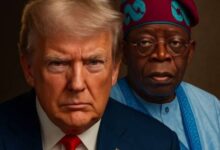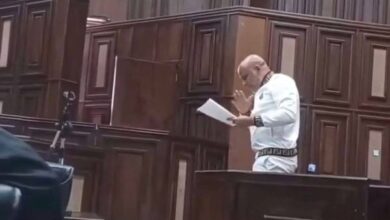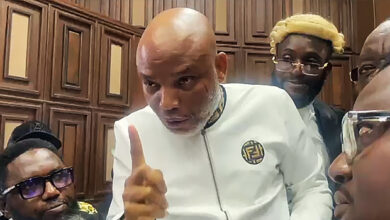Trump Shuts Down Third-Term Speculation, Reaffirms Commitment to U.S. Constitutional Limits

In a carefully timed intervention aimed at quelling mounting speculation, President Donald J. Trump has reaffirmed that he will not seek a third term in office, insisting that he remains firmly committed to the two-term limit enshrined in the U.S. Constitution.
In an exclusive interview aired Sunday on NBC’s Meet the Press, the 78-year-old president told host Kristen Welker:
“I’ll be an eight-year president, I’ll be a two-term president. I always thought that was very important.”
This declaration comes as Trump recently marked his first 100 days into a historic second term, amid swirling rumours—stoked by his own past remarks and the appearance of “Trump 2028” merchandise from The Trump Organization—that he might test the boundaries of democratic norms.
THE CONTEXT: Political Theatre vs. Constitutional Reality
While Trump has long been a master of political spectacle, his flirtation with the idea of a third term has raised alarms among constitutional scholars, opponents, and even some supporters wary of authoritarian overreach.
In earlier rallies and media appearances, Trump has mused—sometimes jokingly—about serving “three, four, or maybe even five terms,” often presenting such lines as bait for media outrage. Yet the appearance of actual campaign-style gear with “Trump 2028” emblazoned across caps and shirts seemed to lend more fuel to the fire.
“This is not something I’m looking to do,” Trump clarified. “To the best of my knowledge, you’re not allowed to do it.”
He added that while he had received “many requests” from loyalists urging him to continue beyond 2029, the rule of law remains paramount.
THE LAW: A High Wall of Constitutional Safeguards
At the heart of this debate is the 22nd Amendment, ratified in 1951 after Franklin D. Roosevelt’s unprecedented four terms in office. It states unequivocally:
“No person shall be elected to the office of the President more than twice.”
Changing that would require a constitutional amendment—a political Mount Everest that needs two-thirds approval in both chambers of Congress and ratification by three-quarters of U.S. state legislatures. Given current partisan divisions and institutional guardrails, such a scenario remains virtually impossible.
BRANDECONOMY INSIGHT: The Power of Perception
Trump’s statement serves multiple strategic purposes. By laying speculation to rest, he shores up legitimacy among constitutional conservatives, tempers international anxieties about American democratic resilience, and—perhaps most crucially—reframes himself as a president who, despite his populist bravado, ultimately respects the rule of law.
But the timing of this announcement also reveals political calculation. With eyes now set on maintaining congressional control in the 2026 midterms and legacy-building in the final stretch of his presidency, Trump needs focus, not distractions. The third-term debate, while theatrically useful, had begun to risk undermining his credibility among independents and constitutionalists.
THE TAKEAWAY: Stability Over Showmanship?
While Trump’s political brand thrives on pushing boundaries, his recent affirmation suggests a rare pivot toward institutional deference. For a president who has defied norms and redefined political communication, this moment of constitutional humility may be less about retreat and more about strategic positioning.
Still, for many political observers, the very fact that such speculation required public clarification is a sobering commentary on the erosion of democratic guardrails globally. In America’s bruised political climate, words matter—but so do norms.
Stay with BRANDECONOMY for insightful, context-rich political coverage. We unpack not just what politicians say, but what it means for governance, institutions, and the markets that rely on them.











